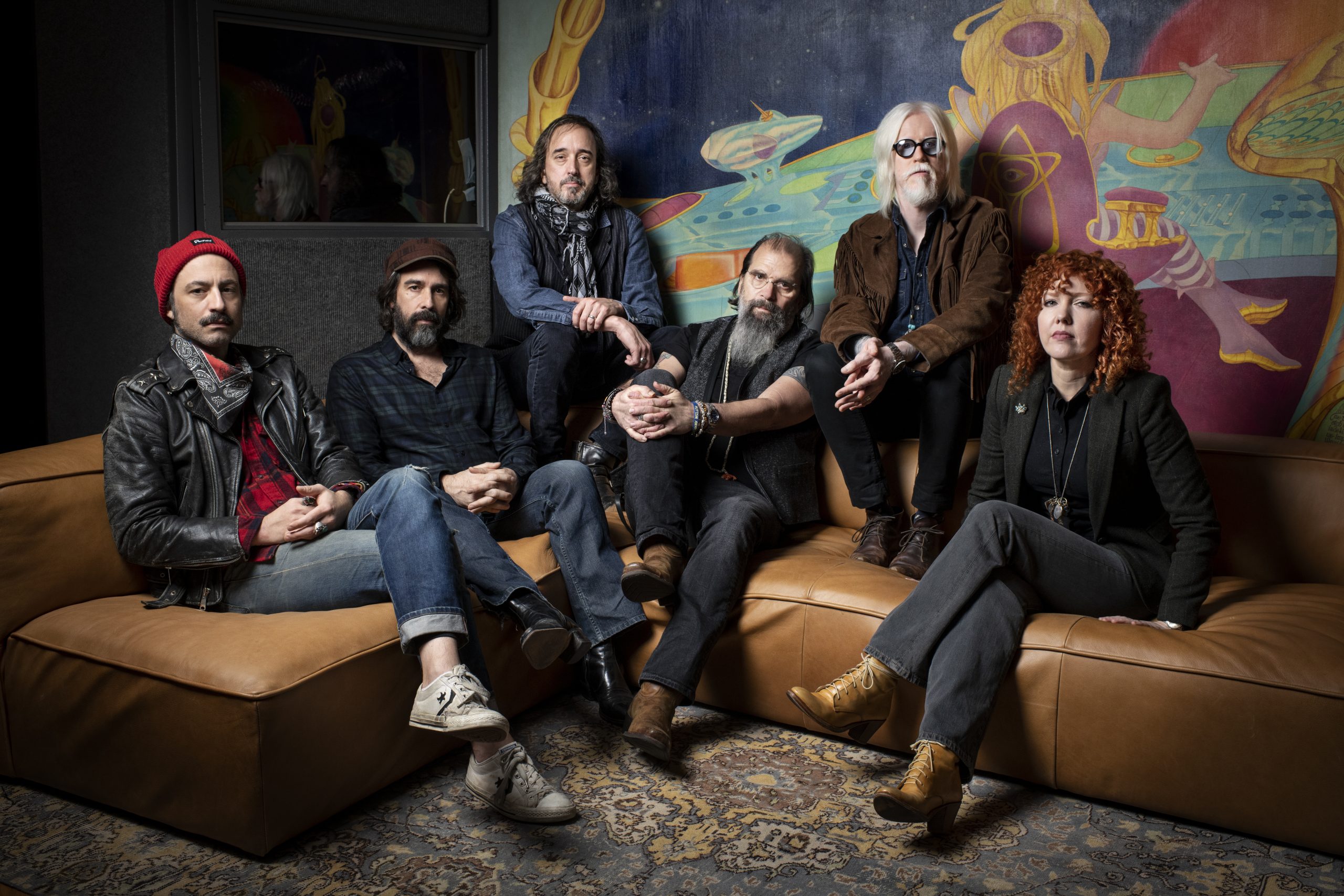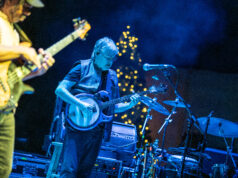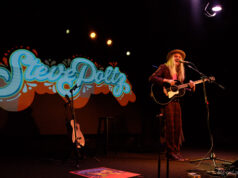
When legendary singer-songwriter Steve Earle got to the “chick song portion of the show” recently, he told his audience at The Birchmere, “I’m not above repurposing a song.” Having had seven marriages to six different women, as well as various other relationships over the years, I can see why he’s had to do that. Everyone wants to know for whom these songs were written, but as he told the audience Wednesday night (and he has said on many other occasions), “They’re all about me.”
He’s also remarked, quite humorously — though he didn’t say it on July 20, “We used to make music for girls. Now we make it for nerds.”
I’ve considered this statement, and I’ve found a flaw in the logic: There are girls who are also nerds; who else is someone like me going to date?
The “chick song portion” of the evening came well into the set, and it included songs from throughout his career: “The Galway Girl,” which sounds like an Irish folk song, from 2000’s Transcendental Blues; “You’re The Best Lover That I Ever Had,” from his 2015 blues album, Terraplane; “You’re Still Standin’ There,” recorded as a duet with Lucinda Williams on I Feel Alright, with her part exquisitely performed by Eleanor Whitmore at The Birchmere; the heartbreaking “Goodbye,” on the previous year’s almost entirely acoustic Train a Comin’, which was covered by Emmylou Harris on her fantastic album Wrecking Ball; and “Sparkle and Shine,” from 2007’s Washington Square Serenade, which won a Grammy for Best Folk Album.
Watch Steve Earle perform “The Galway Girl” live for Carter Vintage Guitars on YouTube:
“I grew up in Texas,” Steve told the audience, “and I didn’t play football, so this was my only chance.” In combing through press coverage of Steve, I found him remarking, “I’m not particularly physical or athletic,” and he mentioned how, when he worked as a carpenter to make ends meet, he had an unfortunate tendency to fall off of roofs.
I can relate.
Earle’s shows are long affairs. He took the stage at 8:30pm, and when the encore was finished, it was 10:45pm. He and his band, The Dukes, had played just shy of 30 songs, delivering both new material from his most recent album, Jerry Jeff, an assortment of songs from his extensive catalog, and, in the encore, a few Grateful Dead covers, which I hadn’t seen him do before.
Steve’s most recent album, Jerry Jeff, released a few months ago, is a tribute to the late Jerry Jeff Walker. It’s the last in a trio of albums dedicated to his teachers: Townes (for Townes Van Zandt) and Guy (for Guy Clark), are the previous two. Steve got to know Walker when he was he hired to be his driver, and he has, “I wanted to be Jerry Jeff Walker.” I can relate, as I’m trying to be Harlan Ellison, and that’s going pretty well.
In addition to the songs he shared from the album — “Getting By,” “Charlie Dunn,” “Wheel,” “I Makes Money, Money Don’t Make Me,” and “Hill Country Rain,” Steve shared a few songs about his former mentor. It was Jerry Jeff, he explained, who first took Jimmy Buffett to Key West. He also shared that Jerry was an inveterate hitchhiker and couch surfer, having written “Mr. Bojangles” while he was crashing at Townes Van Zandt’s apartment.
You can’t talk about Walker without talking about his best-known song, “Mr. Bojangles.” “When you write a song like that,” Steve commented, “it can overshadow everything you do.” I am reminded of a saying amongst my people: “I should have such problems.”
Watch Steve Earle perform a set live for Paste Studio on the Road in New York City, where he ends with “Mr. Bojangles” on YouTube:
After playing the new material, Steve turned the clock way back, all the way to his debut album, 1986’s Guitar Town, playing the title cut and “Someday,” followed by another early hit, “I Ain’t Ever Satisfied,” from 1987’s Exit 0. That album was revisited later in the set with “The Week of Living Dangerously.” Steve and The Dukes played a couple of songs that deal with his southern heritage and the history of that region. “Ben McCulloch,” from Train a Comin,’ examines the issue of class from the perspective of a Confederate soldier serving under that general; “Dixieland” comes from his foray into bluegrass with the Del McCoury Band, The Mountain. And, of course, no Steve Earle show would be complete with “Copperhead Road.”
My favorite of his recent albums is probably 2020’s Ghosts of West Virginia. Most of the songs were written for the play, of the same title, dealing with the Upper Big Branch mining disaster a decade ago, in which 27 men lost their lives. The project dovetailed with Steve’s longstanding activism in progressive politics and advocacy of labor unions. That mine, he explained, was the first in the state not to be unionized, and “it’s not a coincidence” that it was the site of the largest mining disaster in the United States since the 1970s.
“It’s About Blood” is the most chilling powerful, song on the album. Introducing it, Earle talked about Tommy Davis, a miner who was topside when the explosion occurred, but who lost a brother, son, and nephew. “Tommy Davis was pissed,” he said. “Tommy Davis wanted answers.” In the song, Steve calls out the name of every man who lost his life in this tragedy, and it’s a powerful thing to behold. I’m reminded of the statement about how a single life lost is a tragedy, but many lives lost are a statistic. When you hear this song, you feel the pain with each one of those lights forever extinguished.
Stream “It’s About Blood” by Steve Earle & The Dukes on YouTube:
In 2017, Earle made a return to the major labels, albeit briefly, with So You Wanna Be An Outlaw, his most country album since Guitar Town. “Firebreak Line” is a muscular country-rocker about the efforts of “hotshots,” the men and women who fight wildfires — which are only becoming a bigger problem as climate change accelerates. The title cut digs into the whole outlaw ethos created by his heroes, like Willie and Waylon, and “Fixin’ to Die,” while dark is a banger.
When Steve and The Dukes came back for their encore, he spent some time talking about “The Devil’s Right Hand.” It wasn’t, he explained, written as a song about gun control, because, at the time, he had a “trailer full” of weapons. Growing up in Texas, that was part of the culture, and he didn’t see the contradiction between being a peace-loving history and owning his military arsenal. I suspect the contradiction became somewhat more apparent when he eventually ran into some legal trouble on this front. At any rate, the meaning of songs can change, and it’s definitely an anti-gun song now.
Seventeen years ago, Earle relocated from Nashville to New York City, in part because he wanted to write music for theater, which has started to happen. He did that with Ghosts of West Virginia, and he shared that he’s working on a musical adaptation of Tender Mercies with Daisy Foot. For most of his time in the City, he’s lived in Greenwich Village, but he recently bought an apartment in Battery Park. One advantage is his new building has a pool, and his 12-year-old son, who has severe autism, loves to swim. He joked that John Henry might be “a dolphin dropped off the wrong address, because he lives in the water.” “City of Immigrants,” another cut from Washington Square Serenade, is Earle’s tribute to his adopted hometown, and to the mix of peoples who make up that city — and all of America.
To close out the evening, they played a couple of Grateful Dead tunes, “Casey Jones” and “Rag, Mama, Rag.” I’ve read comments from the man where he’s stated that he doesn’t especially care for jam bands, because “they think they sound like the Grateful Dead, and they don’t.” These were songs I’d never seen him perform before, and it was fun to see that material in the show.
The evening began with an opening set by The Whitmore Sisters, consisting of Eleanor Whitmore, who plays violin and keyboards and sings in The Dukes, and her sister, Bonnie. Eleanor has also released several albums with her partner, Chris Masterson, as The Mastersons, and Bonnie has released five solo albums. Chris produced their album, Ghost Stories, which was released earlier this year, and he played guitar with them in their set. The sisters grew up playing in a family band led by their father; their mother was an opera singer. Their dad was also a pilot, and they both have their license. That was the context for their first song, “Learn To Fly,” which is “not about drugs, but it could be.” “The Ballad of Sissy and Porter” is one of the ghost stories alluded to in the album’s title.
Watch the official music video for “The Ballad of Sissy and Porter” by The Whitmore Sisters on YouTube:
Between songs, Eleanor explained that her shirt, which displayed the American flag upside down, was not meant to express disrespect. Rather, she wanted to encourage people to stay involved in the process.
Bonnie described their third number as “the ghost story of my love life.” After “Hurtin’ for a Letdown,” she alluded to the recent Supreme Court decision doing away with the right to choose abortion, saying “The sexiest men in this room are the ones with vasectomies.” The sister finished their set with “Big Heart Sick Mind,” which was “gifted to us by Aaron Lee Tasjan.”
I didn’t intend to write 1,500 words about this concert, and I honestly thought this article would be shorter before I got to work on it. But Steve Earle and the folks he travels with are never lacking in providing grist for the mill; there’s a lot to say and a lot to think about in every show they do. And the music is killer.






After seeing them last night in Boulder, I have to say they were a little ragged. Chautauqua is a pretty damn average venue for a band, poor acoustics and a 95 dB sound limit. I’m not going to say one struggled to hear the band but they just didn’t seem to click. Some of the earlier Exit/Guitar Town songs were well executed, almost because they were originally performed with a bigger band, like what Steve has now. But some of the arrangements for other songs written when the band was a four piece didn’t seem to come across. Now, don’t get me wrong, I am a big Steve Earle fan and have seen him many many times since 1990 and I enjoyed the concert but I left wanting more – unfulfilled as it were. A different venue almost certainly would have changed the whole vibe. Chautauqua seats 1,300, Boulder Theater only 850 so I guess that’s why he winds up at Chautauqua – though it was not sold out. Regardless, I’ll get out to see him next time – and every time – until he decides to call it a day.